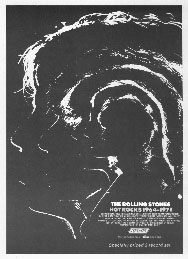![]()
  |

Hot Rocks 1964-1971
The Rolling Stones
London 606/7
Released: December 1971
Chart Peak: #4
Weeks Charted: 233
Certified Gold: 1/20/72
 It would be nice to be able to call this album something like The Rolling Stones' Golden Decade, for the Stones have been the most enduringly prolific highwire act of their time, both reflecting and surpassing the era with a deadly accuracy that can make them seem more dangerous than they really are. But somehow this album merely falls into that venerable Stones tradition of supra-throwaway albums, collections like December's Children and Flowers that by their very slapdash cynicism validate themselves and charm us into feeling that they're as sure a representation of the Stones ethos as brand-new and more unified efforts like Let It Bleed.
It would be nice to be able to call this album something like The Rolling Stones' Golden Decade, for the Stones have been the most enduringly prolific highwire act of their time, both reflecting and surpassing the era with a deadly accuracy that can make them seem more dangerous than they really are. But somehow this album merely falls into that venerable Stones tradition of supra-throwaway albums, collections like December's Children and Flowers that by their very slapdash cynicism validate themselves and charm us into feeling that they're as sure a representation of the Stones ethos as brand-new and more unified efforts like Let It Bleed.
 Click image for larger view. |
As historical document or Greatest Hits culling, Hot Rocks takes almost no chances, and if the Stones or London sometimes display an unexpected sense of what may be the band's most important statements (as in the inclusion of "You Can't Always Get What You Want"), there is also much left out ("Lady Jane," "The Last Time," "It's All Over Now, "She's A Rainbow," "Have You Seen Your Mother, Baby, Standing In The Shadow," "We Love You").
The Stones have never been far from Chuck Berry stylistically, and in the beginning he was as predominant an influence as Ray Charles was for the early Eric Burdon and Joe Cocker. But the Berry-Diddley-Jimmy Reed phase of the Stones' genesis is overlooked in favor of two songs deriving much more from the traditions of uptown soul and pop. Nevertheless, "Time is on My Side" and "Heart of Stone" are vintage Stones, with the arrogant persona that is largely the subject of the first half of their career and the first half of this album already emerging unmistakably, and cemented in "Play With Fire," first entry in the Stones' continuing sometime dalliance with the folk traditions of their native land. "As Tears Go By" derives from those traditions too, but in much more cornball fashion, and one imagines the Stones could have only recorded it to prove the could carry it off, Delsey tissue strings and all.
Always theatrical, the Stones had found a way of molding their basic profile into and out of various synonymous figures. We always sensed that they were basically lower-class street-punks who used to get out and mix it up on Friday nights, even if it may not have been entirely true, but not until "Street Fighting Man" did they take the trouble to play out the role in the most overt fashion possible, and what was even better was that the time was ripe for them to do it in the fashionable context of revolution. They can hardly be blamed for not following through politically, since, just like Dylan and most of the other giants in this business, they are basically involved in finding roles, playing them out and projecting them, and then moving on to new ones. And at least they never pretended, as Lennon does today, to be doing more than that. Listening to "Midnight Rambler" still gives me chills today, but I hardly think Mick Jagger thinks of himself as "a proud Black Panther."
So the Stones, beginning with Beggar's Banquet, moved into a strong new phase where they are beginning to let their fantasies run free, and, if something like "Memo From Turner" from Performance is any indication, Jagger may have even darker dreams than "Midnight Rambler" in store. Unhealthy, perhaps, but undeniably pertinent.
The direction of the Stones' future is clear, though perhaps less predictable than ever before. I doubt they'll ever stop writing songs like "Bitch" and "Live With Me" any more than they'll ever stop copping licks from Chuck Berry. It doesn't matter. They are the most creative and self-sustaining rock & roll band in history, and, despite what some observers say, not tired at all yet. "Gimme Shelter," "You Can't Always Get What You Want," and "Brown Sugar" point the way, and if Jagger & Co. are perhaps the most decadent or even, in the words of some, evil of our heroes, they also have the surest grasp of who we are and where we are going. The Stones will not quail from reflecting it; it's up to us to do something about it.
- Lester Bangs, Rolling Stone, 2-17-72.
Bonus Reviews!
This is London's ultimate repackaging of Stones hits. For those who don't have the original "greatest hits" albums, or who want a retrospective of the Stones' career, this collection serves admirably. London has even managed to get "Brown Sugar" and "Wild Horses" for the reissue, though they originally appeared on the Stones' own label.
Hot Rocks is the cream of the cream; "Under My Thumb" is the only item that was not a major hit for them, though it's fine on its own. "Play with Fire," written by Keith Richard under the name of Nanker Phlege, is gorgeous. The Stones have nailed down the title of World's Tightest and Most Exciting Rock And Roll Band, and there are many, many great moments here -- the fey whoops on "Brown Sugar," Charlie Watt's surprise floor-toms on "Ruby Tuesday," Keith Richard's perfect riff on "Heart of Stone."
I experience two disappointments. First, "The Last Time" is not included: it was one of their smash hits ("Play with Fire" was the flip) and has one of Richard's best solos, a question-answer routine in which he asks the right questions and gives the right answers. Objection two is that Brian Jones' fine harmonica playing is heard nowhere on this album; to get that you have to got to the great ride-out on "What a Shame."
Though the Stones are the WTAMERARB (see second paragraph above), the quality of their songwriting fluctuated (and fluctuates). Beyond this retrospective, I suggest Stones converts get the Between the Buttons album, where they concentrated on playing their best, and the material gives their musicianship a solid base to build on, instead of tying it down. It's their best LP, with the possible exception of Sticky Fingers.
- Joel Vance, Stereo Review, 10/72.
This deluxe, two-record set from London Records contains the greatest hits of the Stones from 1964 through 1971, at which time they left the label. Nothing has been passed over. The must-have collector's items includes "As Tears Go By," "Paint It Black," "Jumping Jack Flash," "Honky Tonk Women" and "Wild Horses."
- Billboard, 1971.
Deluxe packaging of the big Stone rollers from 1964 right up to "Wild Horses" (which isn't on London but comes from their own Rolling Stones label). Most people will have some, if not most, but it makes a nice package.
- Hit Parader, 6/72.
This double-disc anthology contains their biggest hits on London, as well as many of their most popular album tracks. A stereo version of "Satisfaction" is a highlight of the import, even though the US mono version is also pretty cool. * * * *
- Bruce Eder, The All-Music Guide to Rock, 1995.
![]() Reader's Comments
Reader's Comments
No comments so far, be the first to comment.